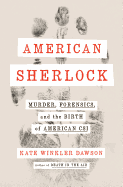
Perhaps the most fascinating revelation contained within Kate Winkler Dawson's (Death in the Air) riveting story of forensics pioneer Edward Oscar Heinrich is that her subject's name isn't already world famous. Unlike the fictitious detective who once lived at 221B Baker Street, Heinrich was a real scientist in Berkeley, Calif., who introduced new methods for analyzing blood splatter, ballistics and fingerprints, and worked on several of the 20th century's most infamous cases.
A journalism instructor, Dawson offers an account of the late scientist's methods, including the questionable conclusions he reached in a murder trial involving actor Fatty Arbuckle. Indeed, Heinrich is portrayed as both a pioneer and a man obsessed, as his frequent spats with rival experts and perennial exhaustion over juries unconvinced by his evidence makes clear. By contrast, Dawson also celebrates some of Heinrich's greatest achievements, which include using scraps of evidence to find the men responsible for the Siskiyou train robbery of 1923.
Ultimately, American Sherlock's greatest strength comes from Dawson's willingness to examine Heinrich's forensic accomplishments by grounding them in modern research that shows the serious flaws in methodologies ranging from lie detectors to hair sample analysis. By understanding why these areas of forensic science sometimes falter, it is possible both to appreciate all that Heinrich accomplished while also proving the discipline still has a long way to go. Furthermore, American Sherlock also serves as a richly detailed overview of how the U.S. justice system and proof of guilt standards have changed--or failed to evolve--during the past century. --Zack Ruskin, freelance reviewer

